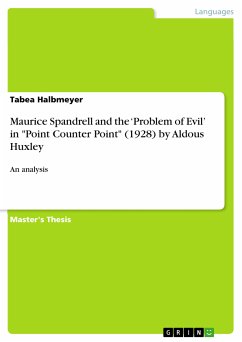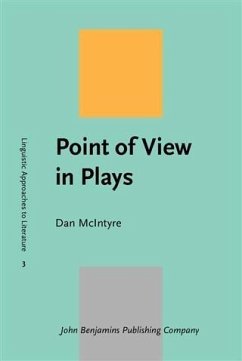
Maurice Spandrell and the 'Problem of Evil' in "Point Counter Point" (1928) by Aldous Huxley (eBook, PDF)
An analysis
Sofort per Download lieferbar
Statt: 42,95 €**
29,99 €
inkl. MwSt. und vom Verlag festgesetzt.
**Preis der gedruckten Ausgabe (Broschiertes Buch)
Weitere Ausgaben:

PAYBACK Punkte
0 °P sammeln!
Master's Thesis from the year 2016 in the subject Literature - Modern Literature, grade: 1,0, Friedrich-Alexander University Erlangen-Nuremberg, language: English, abstract: This paper is an analysis of Huxley's representation of evilness by the example of Maurice Spandrell, a character in his novel "Point Counter Point". Huxley constructed Spandrell as the incarnation of evilness according to the understanding of evilness as an 'unsubstantial' category. Here, 'good' and 'evil' are intertwined as he is represented as a paradoxical figure, namely both as a perpetrator and as a victim. The diale...
Master's Thesis from the year 2016 in the subject Literature - Modern Literature, grade: 1,0, Friedrich-Alexander University Erlangen-Nuremberg, language: English, abstract: This paper is an analysis of Huxley's representation of evilness by the example of Maurice Spandrell, a character in his novel "Point Counter Point". Huxley constructed Spandrell as the incarnation of evilness according to the understanding of evilness as an 'unsubstantial' category. Here, 'good' and 'evil' are intertwined as he is represented as a paradoxical figure, namely both as a perpetrator and as a victim. The dialectics in Spandrell's characterisation are exemplary for the dialectics present in "Point Counter Point" and in modernism in general. Talking a closer look, "Point Counter Point" reveals Huxley's belief in a deeper 'truth' that remains mysterious in its contingent existence of absence and presence. In connection with Huxley's understanding of 'God', which he lays down mainly in his book The Perennial Philosophy (1945), Huxley's representation of evilness alias Spandrell is going to be analysed in this paper.8 There are other characters in Point Counter Point concerned with the question of God, for example, Marjorie Carling.9 However, the focus will be on Spandrell as the contemplations about good and evil concentrate around his character. Spandrell constantly tries to explain God's absence and make his presence felt but he is disappointed again and again. In this way, he embodies the focal point of the 'problem of evil' in Point Counter Point. The root of evil, in Spandrell's case, can be found in his 'individual' psychology. With the help of Spandrell, Huxley reflects on the origin of evil, in particular, on how evilness can develop in a person's life.
Dieser Download kann aus rechtlichen Gründen nur mit Rechnungsadresse in A, B, BG, CY, CZ, D, DK, EW, E, FIN, F, GR, HR, H, IRL, I, LT, L, LR, M, NL, PL, P, R, S, SLO, SK ausgeliefert werden.













